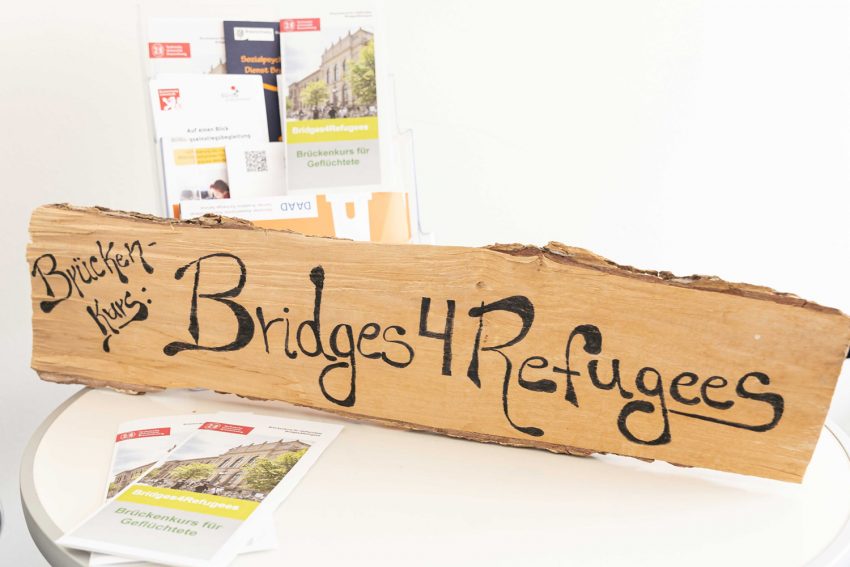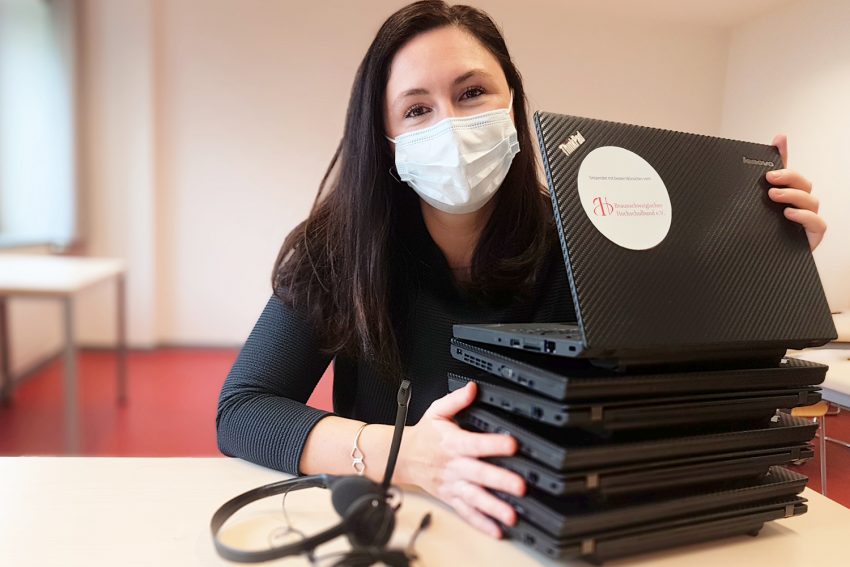Preparatory Courses in Corona Times Braunschweigischer Hochschulbund donates notebooks for refugees
The “Bridges4Refugees” programme has been paving the way for refugees to study since 2016. In the programme funded by the German Academic Exchange Service (DAAD), participants are supported with a scholarship for up to one year and receive German lessons at the Language Centre at the International House of TU Braunschweig. Their goal is to successfully pass the German Language Examination for University Admission (DSH) and then begin their studies. In times of the Corona pandemic, there are lots of new challenges for the participants and those responsible for the courses.

There have been preparatory courses for refugees at TU Braunschweig since 2016. Photo by: International House/TU Braunschweig
The Corona pandemic turned all areas of public life and also university life upside down. Almost overnight, on-site classes became impossible, and all courses began to take place online. What was already a big change for German students was an even bigger challenge for the refugees in the preparatory courses. “The courses thrive on personal exchange and the personal bonds between the participants,” says project coordinator Irene Helm. “With the beginning of the Corona pandemic, all of the things that promote this sense of community were no longer an option. The lack of personal contacts from the courses is even worse for refugees, as they often already have very few contacts in general,” she explains.
New digital services have emerged
From tandem programmes to language café meetings and exchanges with former participants of the programme, everything has been discontinued for more than a year now. However, the organizers of the courses have come up with new formats to support integration of the participants into the university: For example, two online theatre workshops have already taken place. In addition, a Facebook group has been set up in which the participants can exchange information with each other and with their contact persons from the International House.

10 notebooks could already be handed over as a donation. The BHB is now asking for further donations. Photo by: Christian Köcher/Braunschweigischer Hochschulbund
In addition to the lack of personal contact, the technological requirements for the online courses are a major challenge for the participants. “Many refugees do not have their own laptops, which are urgently needed to participate in the online courses. In addition, there is often no reliable internet connection in the refugee accommodations. The learning success can be severely affected if the connection continually breaks up during the lessons,” Helm explains. The Friends and Sponsors Association of TU Braunschweig, the “Braunschweigischer Hochschulbund” (BHB), therefore launched a fundraising campaign and, thanks to the support of TU Braunschweig’s “Sandkasten”, the Rotary Club Braunschweig and numerous private donors, was recently able to hand over ten notebooks and peripherals to the programme, which will now be given to scholars in need. Participant Fatih* is happy that the programme is taking place despite Corona: “I am very happy that I can learn German in spite of Corona. Of course, an in-class course is better than an online course, but you can still learn German effectively in the online courses.”
Women account for just under half of the applications received
Despite all the challenges, the online formats have also had positive effects for the participants. For instance, refugees who do not live in Braunschweig or the region can participate for the first time. Despite Corona, interest in the programme remains high, says Irene Helm. “Over the course of the year, we are supporting about 45 scholarship holders. We have also received numerous applications in recent months. I am particularly glad that more and more of the applicants are women,” says Helm. The number of female applicants has been rising steadily since the project began in 2016 – they now make up almost 50 per cent of the applicants. At the same time, the countries of origin of the scholarship holders have changed. While the majority of participants came from Syria in the first few years, many participants now come from Rwanda, Sudan, Iran and Turkey. Scholarship holder Makosa* is grateful that the Bridges4Refugees programme exists: “German is a difficult language, but the teachers at the Language Centre motivate me a lot. My motto is: practice, practice, practice until I understand everything.”
Donations are still needed
As an end to online study is not yet in sight, the participants are still dependent on donations. The BHB is currently raising funds for webcams, headsets and LTE routers.
* For reasons of anonymity, only the first names of the participants are mentioned.
